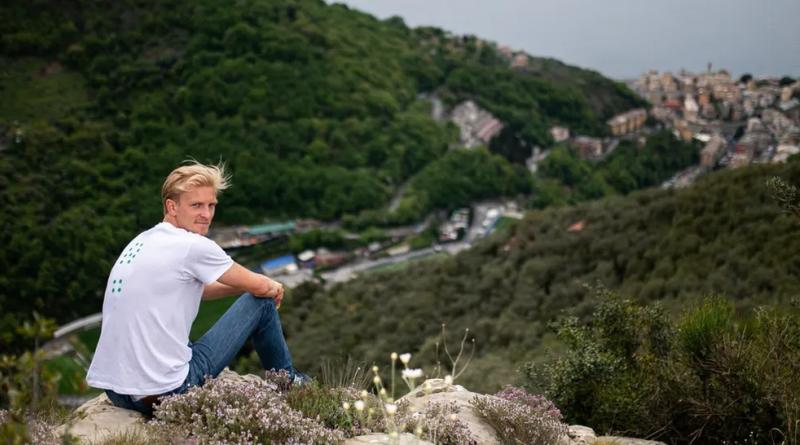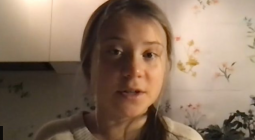Sampdoria’s Morten Thorsby: ‘They call me football’s Greta Thunberg’

Norway midfielder on how the Guardian inspired him to become a climate activist and what players can do to save the planet
I was living on my own for the first time and had a lot of time to read,” says the Sampdoria and Norway midfielder Morten Thorsby, explaining how he went from caring about the environment to becoming a climate emergency activist during his time at Heerenveen.
One campaign in particular made him sit up and take notice, the Guardian’s Keep it in the ground forcing him to have a serious discussion with himself and what he was doing.
“It is such a big issue and no one else was talking about it,” he says. “That made me sad, depressed even.” He considered quitting football. “I thought: ‘We have a mega problem here and what am I doing? Playing football.’ That didn’t make sense to me.”
Having talked about it with family and friends he found a novel approach: trying to open the eyes of those around him. “The football industry is lagging behind when it should be leading,” he says. “It can make a huge difference, it could be our salvation even. Three and a half billion people around the world watch football. There is no social phenomenon that touches so many people. There are no bigger influencers than football stars.”
Thorsby started We Play Green, an “independent collaboration platform for professional football players who want to help the planet out of the climate crisis”. His first small steps took place in Heerenveen, where he played between 2014 and 2019. He started cycling from the training complex to the stadium but was laughed at. He then said why he did it and challenged his colleagues to start doing the same.
“At first you are frowned upon,” he says. “But they gradually came around and the club provided the bikes.” Laughing, he adds: “But if the weather was suddenly really bad they were less happy with me.”
Thorsby joined a working group with people from the club and sponsors to make Heerenveen more sustainable. Solar panels were installed at the stadium and less meat was on the menu. Heerenveen were given the award for most sustainable stadium in 2016.
“They are small steps but if they are publicised they become bigger,” Thorsby says. “That is the power of football.”
He found an ally in the Dutch goalkeeper Maarten de Fockert, who joined Heerenveen at the same time as Thorsby. De Fockert describes Thorsby as “a mountain man”, saying: “He is not super-fast on the pitch but when we went hiking through the Norwegian mountains it seemed like I was standing still; that’s how fast he was. After five hours he would say: we are lost. He liked that. I panicked. We suddenly shot down a slope. I thought I was dying, he enjoyed it. He is really at one with nature.”
De Fockert calls Thorsby “very solution-oriented”. He tells how the Norwegian put tape on his plastic bottle at Heerenveen and wrote his name on it so he could reuse it. “He then doesn’t immediately start shouting that everyone should do that. Morten is kind, authentic and a go-getter. As a result, he gets a lot done.”
Thorsby says it is important to make it personal and not use complicated language. “Clean water and clean air for our children – that’s the message. Who wouldn’t want that?”
Is it difficult to get footballers to think about it? “Yes, it is,” he says. “In the dressing room I am still the ‘green boy’ who is laughed at when he does something less sustainable himself. In Italy, they call me the Greta Thunberg of football. It’s fine – I have enormous admiration for her.
“The mistake the environmental movement has made in the last 20 years is to force it down people’s throats. It’s better to create an atmosphere where it becomes a joint project. Inspire and motivate people to show there are so many things we can do. You can already eat super-tasty things without meat and with lots of vegetables. It’s healthier, you feel better and you do something good for nature.
“Greta Thunberg appeals to the 20% who are already doing something. But the rest must also move in that direction. I want a 100% who take small steps, because many small steps lead to big steps. Government leaders at environmental conferences must feel supported by their people to make changes.”
The task now is to raise funding and build an organisation that will prompt more players to support his initiative. A handful have joined, including Norway’s Mats Møller Dæhli, CSKA Moscow’s Emil Bohinen, the Odd goalkeeper Sondre Rossbach, the Juventus Women midfielder Sofie Junge Pedersen, De Fockert, who has retired, and the former Newcastle player Siem de Jong.
Does he sometimes feel like a lone voice? “I know there are many players interested,” says Thorsby, who last month won the 2021 Fifpro Player Activism award. “They are waiting until we are ready, until we have funded the entire campaign. I can completely understand if players don’t speak out. Everyone is allowed to make their own choices. I just try to encourage them, because we need young people to influence others. Footballers have a responsibility.”
The Black Lives Matter movement has been hugely supported by football, the climate crisis campaign less so. Why? “Racism is a question of yes or no and everyone says no. For a long time there was a lot of misinformation about climate change that made people wonder if it’s really that bad. Now that there are floods and forest fires in Europe, things are already changing. To be honest, professional footballers do a lot of things that are not good for the environment. And everyone feels attacked when they don’t do something right.
“I try to make it clear to them that if you just, for example, use the dryer a little less or don’t eat meat at lunch any more, you’re already making a difference. Take a commercial flight instead of a private jet. Drive an electric car. And then it would be great if players share that with their followers on social media.”
Twice Thorsby has participated in plastic collections in Genoa. He has also met local authorities to get more trees planted and made the case for separate waste recycling. At the beginning of this season he swapped to wearing No 2 to draw attention to the United Nations’ goal of keeping global warming well below two degrees celsius. “I wanted No 15 and then a dot between the one and the five but that wasn’t possible. No 2 was fortunately still free.”
The Sampdoria captain, Fabio Quagliarella, was bemused as to why the midfielder had picked that number but as soon as Thorsby explained the striker was on board and asked him to tell the rest of his teammates. He received a huge applause after he told them.
Thorsby has met the Italian environment minister, the Norwegian prime minister and spoken to Frans Timmermans, who is leading the European Commission’s work on the European Green Deal and its first European climate law.
He was energised by an online meeting with Timmermans, which also included De Fockert and De Jong.
“Frans is a big football fan and heard about the reasons behind my change of number,” Thorsby says. “He supports us and wants to work together. That’s fantastic and thanks to football.”
A version of this article was published in the Dutch newspaper De Volkskrant in November
PHOTO: Morten Thorsby on football’s relationship with the climate crisis: ‘It is lagging – it should be leading.’ Photograph: Simone Arveda/Pegaso Newsport/We Play Green






